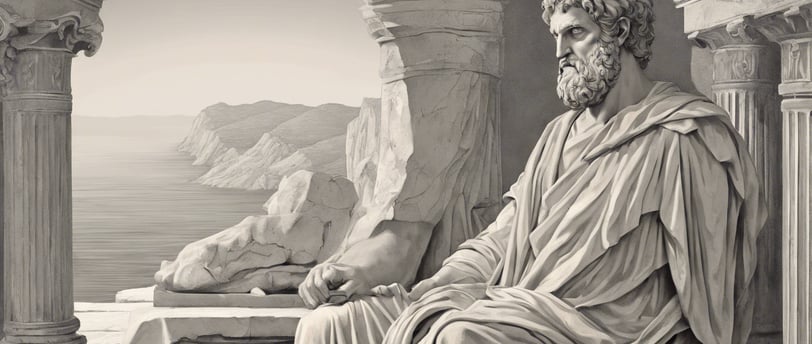Logos in Stoicism: Understanding the Divine Reason of the Universe
Logos, a central concept in Stoic philosophy, represents the divine reason or rational principle that governs the universe. This Greek term, often translated as "word," "reason," or "plan," is fundamental to understanding Stoic cosmology and ethics.
8/4/20242 min read


What is Logos in Stoic Philosophy?
Logos, a central concept in Stoic philosophy, represents the divine reason or rational principle that governs the universe. This Greek term, often translated as "word," "reason," or "plan," is fundamental to understanding Stoic cosmology and ethics.
The Origins of Logos in Stoicism
Ancient Greek Roots
The concept of Logos predates Stoicism, appearing in ancient Greek philosophy. However, the Stoics, beginning with Zeno of Citium in the 3rd century BCE, developed it into a cornerstone of their philosophical system.
Stoic Interpretation
In Stoic thought, Logos is not just an abstract principle but an active, generative force that permeates all of reality.
Key Aspects of Logos in Stoic Thought
Universal Reason: Logos as the rational structure of the cosmos
Divine Providence: The idea that the universe is governed by a benevolent plan
Natural Law: Logos as the source of moral and physical laws
Human Rationality: The belief that human reason is a fragment of the universal Logos
Logos and Stoic Ethics
Understanding Logos is crucial for grasping Stoic ethics:
Living in accordance with nature (and thus, Logos)
Cultivating reason to align with the universal Logos
Accepting events as part of the divine plan
Practical Applications of Logos in Modern Life
Rational decision-making
Seeking harmony with the natural order
Developing a cosmic perspective on personal challenges
Practicing mindfulness and self-reflection
The Influence of Logos Beyond Stoicism
In Philosophy
The concept of Logos has influenced various philosophical and religious traditions, including:
Neoplatonism
Christian theology
Islamic philosophy
In Modern Thought
Today, the idea of Logos continues to inspire:
Systems thinking
Holistic approaches to science and ecology
Mindfulness and meditation practices
Challenges to the Concept of Logos
While influential, the Stoic concept of Logos faces criticism:
Scientific materialism challenges the idea of a purposeful universe
Existentialist philosophies question the existence of inherent meaning
Postmodern thought critiques grand narratives like universal reason
Conclusion: The Enduring Relevance of Logos
Despite challenges, the Stoic concept of Logos remains a powerful framework for understanding our place in the universe. It offers a path to meaning, ethical living, and cosmic harmony that resonates with many in our complex modern world.
Waste no more time arguing about what a good man should be. Be one - Marcus Aurelius
We suffer more often in imagination than in reality - Seneca
Wealth consists not in having great possessions, but in having few wants - Epictetus
